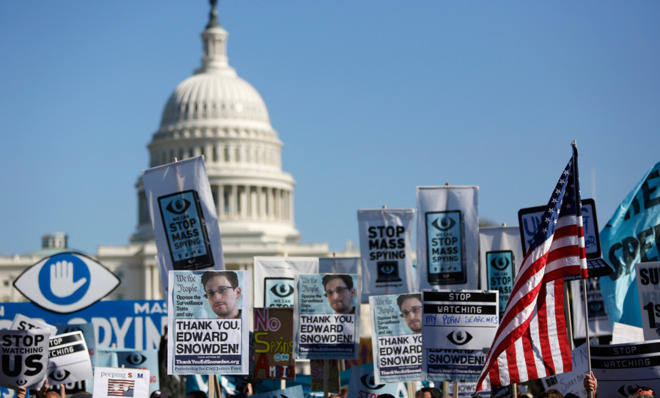Does the public still care about the NSA?


A free daily email with the biggest news stories of the day – and the best features from TheWeek.com
You are now subscribed
Your newsletter sign-up was successful
Of the 1.7 million pages of classified documents that Edward Snowden stole from the National Security Agency, a mere 1,057 have been published — .0062 percent, according to Cryptome's tally. That's just more than one twentieth of one percent of a cache that, by definition, could reasonably be expected to cause grave harm to national security if disclosed.
But interest in the saga and support for Snowden seems to be waning.
A new NBC News/Wall Street Journal polls finds that a plurality of Americans have no idea whether Snowden did the right thing in stealing and then leaking the documents. Twenty-three percent support Snowden's actions. But the rest are split between opposing them or not having an opinion. "When 'no opinion' leads, it means they really don't care," is how NBC News put it.
The Week
Escape your echo chamber. Get the facts behind the news, plus analysis from multiple perspectives.

Sign up for The Week's Free Newsletters
From our morning news briefing to a weekly Good News Newsletter, get the best of The Week delivered directly to your inbox.
From our morning news briefing to a weekly Good News Newsletter, get the best of The Week delivered directly to your inbox.
In July, a plurality of Americans had a negative view of Snowden, even after the first wave of highly favorable and even adulatory press coverage. At the same time, Americans believed he was a legitimate whistleblower. One way to interpret these dissonant numbers is to imagine that Americans grudgingly see the necessity of having a debate about surveillance and validate Snowden's role in fostering it, even if they tend to be skeptical of his motives and judgment.
What's the reason for this? It may be that the drip-drop of revelations aren't very revelatory anymore. Having promised a tableau that would show the world subject to an incredibly intrusive and mind-altering surveillance state, all we've gotten is confirmation the NSA holds our telephone records and has strict, if not perfect, criteria they use to query them, and that it has a pretty spectacular capacity to ingest information, including some of our own.
The public seems less concerned that the NSA works to actively undermine encryption or tinkers with virtual worlds to try and discover and disrupt new means of clandestine communication because, it turns out, they do a passable job of keeping our communications out of it. The premise of the leaked documents — that they show an unvarnished truth — tends to cancel out the most extreme versions of the world that Snowden portrayed. They show an agency that got well ahead of its skies and was in need of a hard dollop of truth and transparency — props to him for that — but they also show an agency that struggled to get it right, in secret, when no one was looking.
In this week's The New Republic, Princeton historian Sean Wilentz probes the background of Snowden, of the man who brought his documents to the world, Glenn Greenwald, and of Julian Assange, who is providing for Snowden's defense and who helped him escape to Russia. All three men have, in Wilentz's telling, revolutionary agendas that go well beyond that of surveillance reform. Wilentz is getting a lot of flack for what is, essentially, a very long and elaborate ad hominem argument against the motives of three unique men in our history. His point is that Americans are not ever going to be in sync with any of these radical libertarians, and he hints that this disjuncture may mean that broader NSA or intelligence reform efforts are doomed.
A free daily email with the biggest news stories of the day – and the best features from TheWeek.com
In general, I think that Americans have largely accepted the reality of the surveillance state in their lives and do not believe they are empowered to change it, and may not even think it wise.
Marc Ambinder is TheWeek.com's editor-at-large. He is the author, with D.B. Grady, of The Command and Deep State: Inside the Government Secrecy Industry. Marc is also a contributing editor for The Atlantic and GQ. Formerly, he served as White House correspondent for National Journal, chief political consultant for CBS News, and politics editor at The Atlantic. Marc is a 2001 graduate of Harvard. He is married to Michael Park, a corporate strategy consultant, and lives in Los Angeles.
-
 Political cartoons for February 16
Political cartoons for February 16Cartoons Monday’s political cartoons include President's Day, a valentine from the Epstein files, and more
-
 Regent Hong Kong: a tranquil haven with a prime waterfront spot
Regent Hong Kong: a tranquil haven with a prime waterfront spotThe Week Recommends The trendy hotel recently underwent an extensive two-year revamp
-
 The problem with diagnosing profound autism
The problem with diagnosing profound autismThe Explainer Experts are reconsidering the idea of autism as a spectrum, which could impact diagnoses and policy making for the condition
